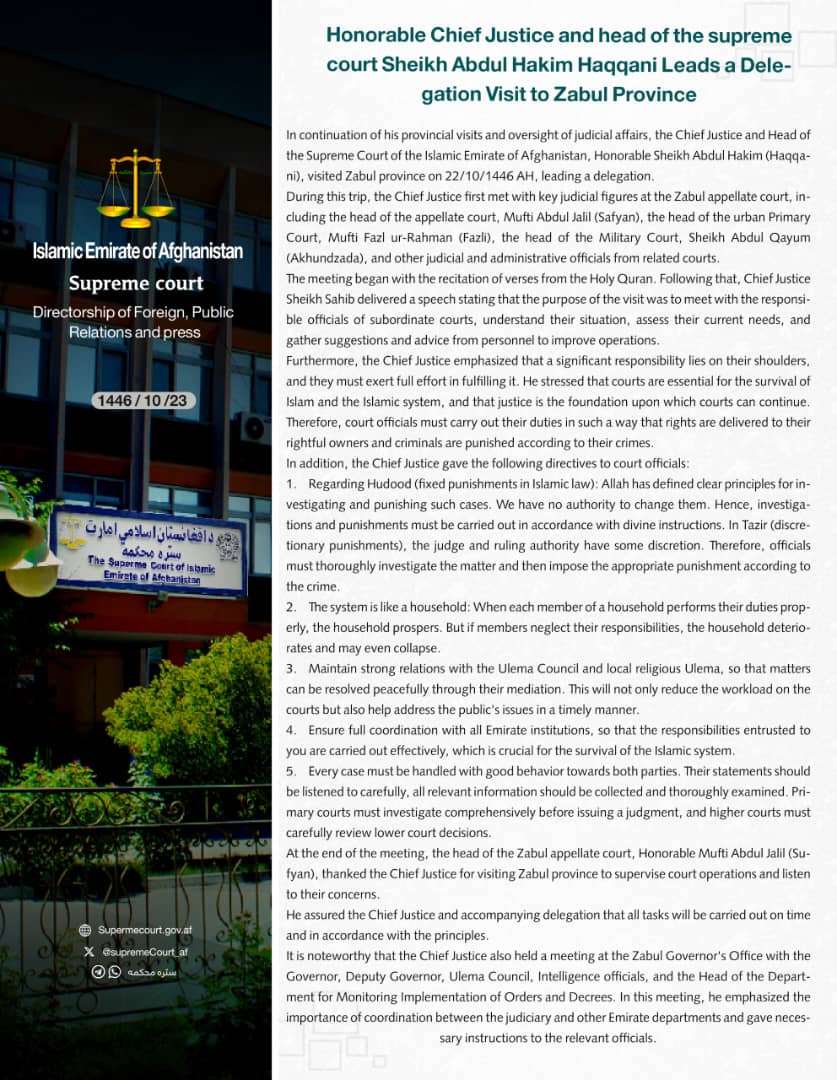Honorable Chief Justice and head of the supreme court Sheikh Abdul Hakim Haqqani Leads a Delegation Visit to Zabul Province

In continuation of his provincial visits and oversight of judicial affairs, the Chief Justice and Head of the Supreme Court of the Islamic Emirate of Afghanistan, Honorable Sheikh Abdul Hakim (Haqqani), visited Zabul province on 22/10/1446 AH, leading a delegation.
During this trip, the Chief Justice first met with key judicial figures at the Zabul appellate court, including the head of the appellate court, Mufti Abdul Jalil (Safyan), the head of the urban Primary Court, Mufti Fazl ur-Rahman (Fazli), the head of the Military Court, Sheikh Abdul Qayum (Akhundzada), and other judicial and administrative officials from related courts.
The meeting began with the recitation of verses from the Holy Quran. Following that, Chief Justice Sheikh Sahib delivered a speech stating that the purpose of the visit was to meet with the responsible officials of subordinate courts, understand their situation, assess their current needs, and gather suggestions and advice from personnel to improve operations.
Furthermore, the Chief Justice emphasized that a significant responsibility lies on their shoulders, and they must exert full effort in fulfilling it. He stressed that courts are essential for the survival of Islam and the Islamic system, and that justice is the foundation upon which courts can continue. Therefore, court officials must carry out their duties in such a way that rights are delivered to their rightful owners and criminals are punished according to their crimes.
In addition, the Chief Justice gave the following directives to court officials:
1. Regarding Hudood (fixed punishments in Islamic law): Allah has defined clear principles for investigating and punishing such cases. We have no authority to change them. Hence, investigations and punishments must be carried out in accordance with divine instructions. In Tazir (discretionary punishments), the judge and ruling authority have some discretion. Therefore, officials must thoroughly investigate the matter and then impose the appropriate punishment according to the crime.
2. The system is like a household: When each member of a household performs their duties properly, the household prospers. But if members neglect their responsibilities, the household deteriorates and may even collapse.
3. Maintain strong relations with the Ulema Council and local religious Ulema, so that matters can be resolved peacefully through their mediation. This will not only reduce the workload on the courts but also help address the public's issues in a timely manner.
4. Ensure full coordination with all Emirate institutions, so that the responsibilities entrusted to you are carried out effectively, which is crucial for the survival of the Islamic system.
5. Every case must be handled with good behavior towards both parties. Their statements should be listened to carefully, all relevant information should be collected and thoroughly examined. Primary courts must investigate comprehensively before issuing a judgment, and higher courts must carefully review lower court decisions.
At the end of the meeting, the head of the Zabul appellate court, Honorable Mufti Abdul Jalil (Sufyan), thanked the Chief Justice for visiting Zabul province to supervise court operations and listen to their concerns.
He assured the Chief Justice and accompanying delegation that all tasks will be carried out on time and in accordance with the principles.
It is noteworthy that the Chief Justice also held a meeting at the Zabul Governor's Office with the Governor, Deputy Governor, Ulema Council, Intelligence officials, and the Head of the Department for Monitoring Implementation of Orders and Decrees. In this meeting, he emphasized the importance of coordination between the judiciary and other Emirate departments and gave necessary instructions to the relevant officials.
